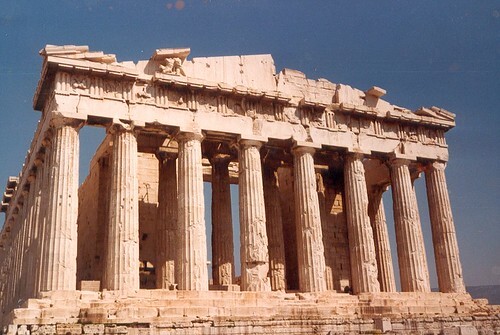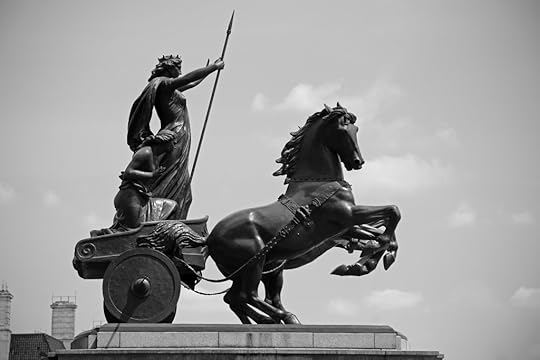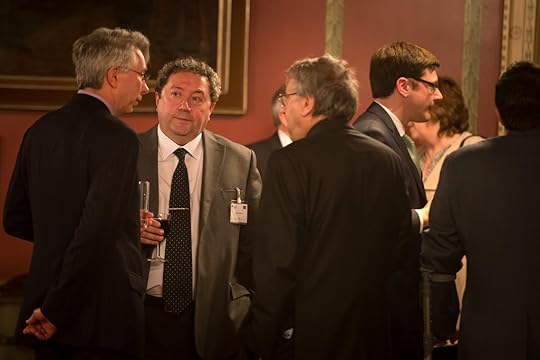Robin Helweg-Larsen's Blog, page 11
April 25, 2025
Political poem: A.E. Stallings, ‘An American Wakes Up in Athens, Greece After the 2024 Elections’

I wake up in the dark.
In dark I went to sleep.
There is a kind of stark
Accounting of lost sheep.
The day breaks with a dawn
So much like yesterday’s.
I turn the kettle on
And brew a dark malaise.
Things go from bad to worse,
Let’s call it entropy.
The blessing is a curse,
And treachery goes free
Or something. Never mind,
Here in the cradle of
Democracy I find
There’s history enough —
There on the shining rock
The entasis of state,
The subtle curves that lock
The crooked to the straight.
The centuries were slow
Where stood its solid scenes,
It took one night to blow
The roof to smithereens.
It boasts of Marathon,
It boasts of Salamis
Five generations on,
Of hemlock’s bitterness,
Between, the city nations
Of Greeks warred tribe with tribe
Why trouble with invasions?
It’s easier to bribe.
We still read Athens’ versions,
As though the Spartans lost,
As though the prudent Persians
Did not know what they cost.
Pericles died of plague,
And Phidias in prison.
Division’s sown, and vague
Suspicions have arisen.
It took nine years to build
Those columns in the air,
But half its marbles spilled,
Over fifty to repair.
It’s like a foundered ship,
That ruin on the hill.
It makes my heartbeat skip.
I’m afraid it always will.
*****
A.E. Stallings writes: “I [wrote this] poem the day after the elections. It was written on the fly, and has not been revised.”
‘An American Wakes Up in Athens, Greece After the 2024 Elections’ was originally published in Liberties Journal.
A.E. Stallings is the current Oxford Professor of Poetry. This Afterlife: Selected Poems was published in 2022. Her forthcoming book is Frieze Frame: How Poets, Painters, and their Friends Framed the Debate Around Elgin and the Marbles of the Parthenon
Photo: “Parthenon” by R~P~M is licensed under CC BY-NC-ND 2.0.
April 23, 2025
Jerome Betts, ‘Lines On A Lady In Bronze’

(The statue of Boadicea and her Daughters by Thomas Thornycroft was erected in 1902 near Westminster Bridge London.)
Set up, the civic skyline Shardless,
A proxy late Victoria then,
She charges, rein-free, grim, regardless,
Towards the Gothic giant, Big Ben.
Just what is known about this fiery
And long ago wronged ruler’s life?
Such fields for scholarly enquiry
Are now churned up by toxic strife.
For some, her Roman power rejection
Makes for a memory well kept green,
While others mock as myth-confection
Their proto-Brexit British queen.
Remainers, Leavers, play Have at you!
That chariot and rearing pair
Of horses make a super statue.
Whoever wins, she’ll still be there.
*****
Jerome Betts writes: “I find statues fascinating with their largely unchanging nature as the people and scenes around them change and they make an obvious target for revolutionaries, rowdies and rhymers. Boadicea, unveiled without ceremony in 1902 because of Edward the 7th’s appendicitis, strikes me as a splendid piece of slightly unhistorical sculpture and useful landmark for visitors. Amusement at her lack of reins and apparent charge towards the Palace of Westminster blended with the Brexit debate when the piece was published in Better Than Starbucks. Whether this dooms the last two stanzas to the archives remains to be seen.”
Jerome Betts lives in Devon, England, where he edits the quarterly . Pushcart-nominated twice, his verse has appeared in a wide variety of UK publications and in anthologies such as Love Affairs At The Villa Nelle, Limerick Nation, The 1, 2 and 12, and Beth Houston’s three Extreme collections. British, European, and North American web venues include Amsterdam Quarterly, Better Than Starbucks, , The Asses of Parnassus, The Hypertexts, The New Verse News, and .
Photo: “Boadicea Statuary Group” by Rafesmar is licensed under CC BY-SA 3.0.
April 21, 2025
Using form: RHL, ‘(on the value of learning languages when) Roughing It In Europe’

One two three four
Is OK, but you need more:
Un deux trois quat’
If you want a welcome mat
En to tre fire
With the krone getting dearer,
Bir iki uç dirt
Selling off your jeans or shirt
Wahid zoozh teleta arba
In a cafe by the harbour
Üks kaks kolm neli
For some food to fill your belly;
Jeden dwa trzy cztery
Language may be shaky, very,
Uno dos tres cuatro
But they’ll love you if you’re up to
Eins zwei drei vier
Trying freely, laughing freer.
*****
This is one of my youthful hitchhiking days poems… It has just been republished in Firewords Campfire, but was originally in Unsplendid (and then in Better Than Starbucks, and Orchards Poetry Journal).
Firewords paired it with a short story, and commented they were “very different adventures, both centred on the art of connection: one through clumsy but charming attempts to bridge language gaps abroad, the other via a game that becomes a quiet battleground for attention, memory, and something close to intimacy. In both, every word counts.” It is always interesting to hear other people’s takes.
Artwork by Jay Carter, an illustrator from Lancashire who enjoys creating bold, colourful images, often finding inspiration in books, films, history, nature and travel. jaycarterillustrator.com
April 19, 2025
RHL, ‘Raised by Expatriates’

When I was young, best thing I’d seen
was Morgan’s fort gone under green
in jungled Panama.
The only flags in forests there
were what leaf-cutting ants could bear:
for planet’s anima.
I touched skulls resting in plain view
in empty deserts in Peru:
mud walls stood rainlessly.
I sailed on seas beyond all land,
stood with a sloth, yes, hand in hand,
saw men drink sugared sea.
I learned to bodysurf in waves;
I climbed cliffs, and saw bats in caves,
saw beaches of pink sand.
Result? I always loved to roam
but nowhere lets me call it home,
All lands are not my land.
Some places I’m a citizen
but never been a denizen;
with others, the reverse:
the places that I’ve lived in most
ignore me like an unseen ghost,
foreign, vague-skinned, perverse.
The wind has blown me since my birth,
my home is nowhere on the earth,
from place to place I roam.
My parentage determined that
my citizenship’s “Expatriate”…
so… everywhere is home.
*****
Not all my poems are autobiographical, even if first-person. This one is. It was published recently in the Amsterdam Quarterly (thanks, Bryan R. Monte!)
April 18, 2025
A.E. Stallings, ‘Anosmia’

Without it, what is lemon, what is mint? –
Coffee and chocolate, caffeinated brown.
Ghosted by a sense that takes no hint,
I feel let down.
It’s hardly tragedy that I can’t tell
The milk’s gone off, eggs rotten. It’s no joke
With other things though – no internal bell
That signals smoke
(The toast burned or the house on fire). Sweet
I have, and bitter, I have sour and salt,
But without smell, no flavour is complete.
There’s no … gestalt.
It’s something I’d predict of old, old age,
This weaning from the welter of the world
The better, perhaps, to leave it. I’m no sage,
I’d rather the impearled
Jasmine flowers – fragrance of the stars –
Light up the brain’s grey matter, and the hurt
Of memory, the human musk of ours
In an unwashed shirt.
‘To have a nose for’– isn’t it a skill,
A wry intelligence, a kind of knack?
What thought trails do I lose, untraceable,
What wisdom lack?
I miss the laundry scent they call ‘unscented’.
Like a depression, it makes it hard to write.
What is is less, less there, half uninvented,
And I, not quite.
But there are days I almost have a whiff:
I slice a lemon open for the crisp
Sun-saturated redolence, and sniff
And stand in the eclipse.
*****
A.E. Stallings writes: “My sense of smell is coming back gradually, but it was completely wiped out for about six months! Unnerving.”
‘Anosmia’ was first published in the London Review of Books.
A.E. Stallings is the current Oxford Professor of Poetry. This Afterlife: Selected Poems was published in 2022. Her forthcoming book is Frieze Frame: How Poets, Painters, and their Friends Framed the Debate Around Elgin and the Marbles of the Parthenon
“Smell” by Dennis Wong is licensed under CC BY 2.0.
April 16, 2025
Political poem: Michael R. Burch, ‘Not Elves, Exactly’

after Robert Frost’s “Mending Wall”
Something there is that likes a wall,
that likes it spiked and likes it tall,
that likes its pikes’ sharp rows of teeth
and doesn’t mind its victims’ grief
(wherever they come from, far or wide)
as long as they fall on the other side.
*****
Michael R. Burch writes: “Many people misunderstand the most famous phrase in Robert Frost’s poem ‘Mending Wall.’ In the poem Frost’s neighbor quotes his father’s adage that “Good fences make good neighbors” as they work together to repair an unnecessary wall on the border of their properties. Talk about a misunderstanding: this phrase has even been used by politicians to justify apartheid walls and similar barriers! But Frost did not share his neighbor’s belief and compared him to a stone-armed savage who moved in primitive darkness and could not go beyond his father’s saying. Frost’s own belief about such walls was expressed in the poem: “Before I built a wall I’d ask to know / What I was walling in or walling out / And to whom I was like to give offense.” At the end of the poem, Frost considers teasing his neighbor with the idea that mischievous elves are responsible for the wall falling down, but decides to hold his peace. My title questions who builds such walls: ‘Not Elves, Exactly’ but something much darker and more ominous.”
Michael R. Burch’s poems have been published by hundreds of literary journals, taught in high schools and colleges, translated into 22 languages, incorporated into three plays and four operas, and set to music, from swamp blues to classical, 61 times by 32 composers. He is also the founder and editor-in-chief of The HyperTexts.
“The Wall Has Spikes” by Kevan is licensed under CC BY 2.0.
April 14, 2025
Max Gutmann: Planet of Love

Venus, our neighbor that lies toward the sun,
Is a sultry and amorous spot;
The astrologers tell us our passion and fun
Are engendered right there, where it’s hot.
She’s the brightest of stars yet she’s hidden in cloud,
So her pull on our psyches is double,
An enticing enigma concealed in her shroud
And, like all such allurements, big trouble.
To the faithfully married, the word from above
About passionate partnership stings.
There’s a planet we’re told governs all earthly love,
And it isn’t the one with the rings.
*****
Max Gutmann writes: “I’m afraid I can’t think of anything interesting to say about ‘Planet of Love,’ which exists to support its punchline. The joke popped into my mind, so I wrote the poem.”
‘Planet of Love’ was published in the March 2025 issue of Lighten Up Online.
Max Gutmann has contributed to New Statesman, Able Muse, Cricket, and other publications. His plays have appeared throughout the U.S. (see maxgutmann.com). His book There Was a Young Girl from Verona sold several copies.
April 12, 2025
Michael R. Burch, ‘Funding Fundamentals’

“I found out that I was a Christian for revenue only and I could not bear the thought of that, it was so ignoble.” — Mark Twain
Making sense from nonsense is quite sensible! Suppose
you’re running low on moolah, need some cash to paint your toes …
Just invent a new religion; claim it saves lost souls from hell;
have the converts write you checks; take major debit cards as well;
take MasterCard and Visa and good-as-gold Amex;
hell, lend and charge them interest, whether payday loan or flex.
Thus out of perfect nonsense, glittery ores of this great mine,
you’ll earn an easy living and your toes will truly shine!
*****
Originally published by Lighten Up Online. NOTE: A flex loan is a payday loan with a “personal line of credit” that makes it even harder to pay off than traditional payday loans. Caveat emptor.
Michael R. Burch writes: “Living in allegedly ‘Christian America’ where 80% of evangelicals voted for the Antichrist Trump, I am forced to resort to foxhole humor. ‘Funding Fundamentals’ is tongue-in-cheek foxhole humor, but I think we would be better off forming our own religions than donating money to false profits like the bible-hawking Trump and his cronies.”
Michael R. Burch’s poems have been published by hundreds of literary journals, taught in high schools and colleges, translated into 22 languages, incorporated into three plays and four operas, and set to music, from swamp blues to classical, 61 times by 32 composers. He is also the founder and editor-in-chief of The HyperTexts.
April 11, 2025
Ruth S. Baker, ‘Moneykind’

That kind of money is swishy and flashy.
That kind of money’s a bore, I find;
That kind of money is fishy and splashy.
That kind of money is not my kind.
My kind of money is somewhat quieter.
My kind of money won’t hog the stage.
My kind of money’s a long-term dieter:
My kind of money is slim for its age.
That kind of money is horribly tethering.
That kind of money one’s better without.
My kind of money’s enough for anything.
(Anything more I’ve forgotten about.)
*****
‘Moneykind’ was originally published in The Asses of Parnassus. Ruth S. Baker writes: “It was triggered really just by catching myself out trying to feel superior to people with that kind of money! As for bio, I’ve published in a few journals on line, mostly on animals and visual art.”
Photo: “Cooperate game companies have too much money and control of the market” by The People Speak is licensed under CC BY-NC 2.0.
April 9, 2025
Brooke Clark, ‘Letter from an Unknown Writer’

We met one night at a book launch,
we drank, we talked, we laughed,
I said, “I’m writing a novel,”
and you said, “Send me a draft.”
So I sent it to your address
hoping a well-placed word
from you would get me started;
I waited, but never heard.
Now you’ve published your latest
and the critics fellate you in print,
it’s a runaway bestseller
and Hollywood’s taken the hint.
I read it myself last weekend
and my entrails turned to stone—
my book, but so badly rewritten
you’d almost made it your own.
*****
Brooke Clark writes: “This two-liner by Martial (Epigrams I.38) is the basis of my poem:
quem recitas meus est, o Fidentine, libellus:
sed male cum recitas, incipit esse tuus.
(The book you’re reciting is mine, Fidentinus; but when you recite it badly, it begins to be yours.)
Originally read in Wheelock’s Latin, I think, when I was learning the language, this was one of the first versions of Martial I did that I was happy with. I obviously expanded it greatly (I hadn’t learned to appreciate Martial’s concision) but I liked the swingy rhythm and the treatment of it as a mini-narrative that I landed on. Also one of the first epigrams I published, in Light, which gave me some confidence that the project of turning ancient epigrams into contemporary poems might be worth pursuing.”
Brooke Clark is the author of the poetry collection Urbanities and has published work in Arion, Literary Imagination, THINK, The Walrus, LA Review of Books, and other places. He is also the editor of the online epigrams journal The Asses of Parnassus and the book reviews editor at Able Muse.
Twitter: @thatbrookeclark
Bluesky: @brookeclark.bsky.social
Photo: “Treasures of Ushaw Book Launch in Westminster” by Catholic Church (England and Wales) is licensed under CC BY-NC-SA 2.0.



